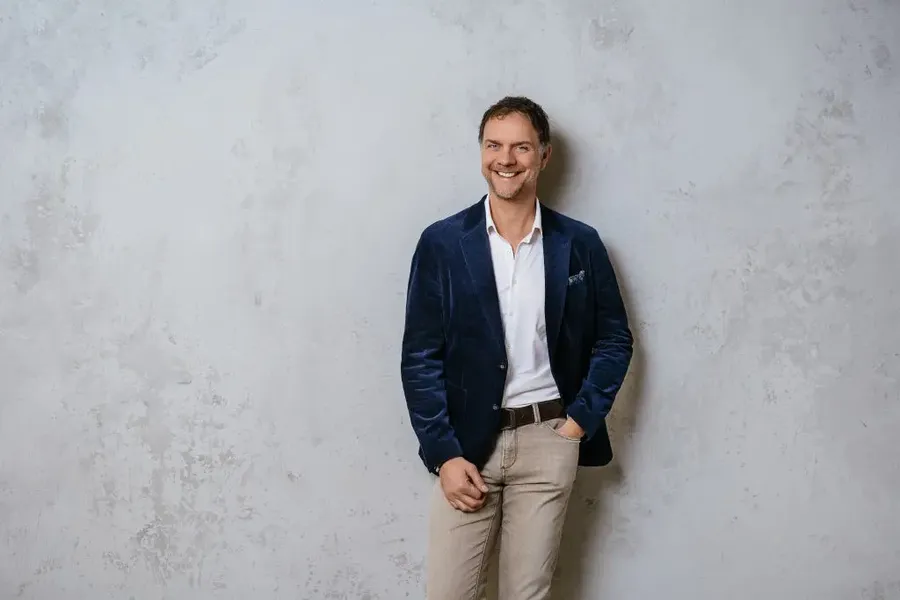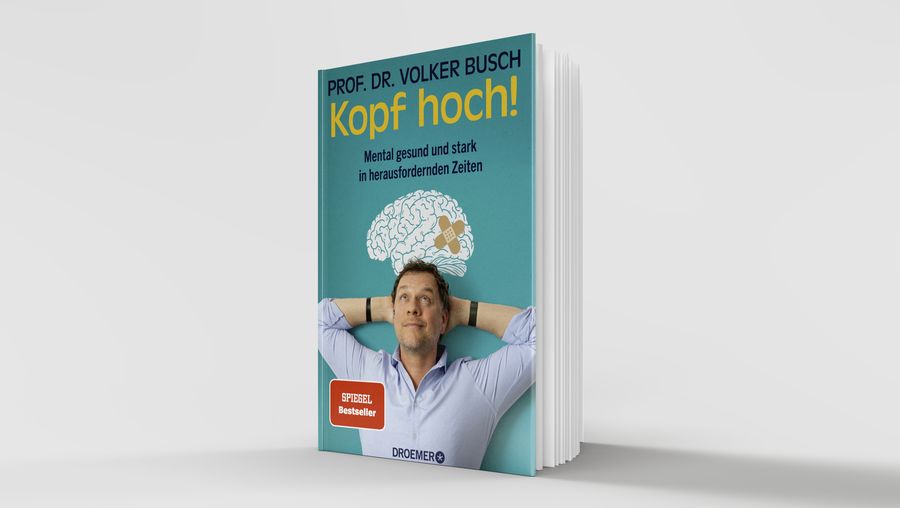Interview with Prof. Dr. Volker Busch
"It’s never too late to benefit from a healthy lifestyle."
Focused thinking, less forgetfulness, preventing diseases: Our brain starts to age early, but differently than thought. Neurologist Prof. Dr. Volker Busch shows us what everyone can do to keep their brain young and as healthy as possible into old age.

Prof. Dr. Volker Busch
The neurologist and neuroscientist is also a successful public speaker and multiple bestselling author. His latest book: Head Up! Mentally healthy and strong in challenging times (Droemer Verlag).
At what age does our brain typically start to age?
"Aging begins from the very first second we are in this world. Initially, our brain grows and produces an incredible number of nerve cells in reserve, as well as synapses, which are the contact points between nerves. However, from the age of three, these processes start to change: the brain begins to reorganize a large part of the synapses and nerve cells. While brain mass is reduced, it is not because of mental decline, but rather an efficiency strategy.
When talking about the aging of the brain, it should not automatically be equated with a decline. Aging here primarily means reorganization - always with the aim of improving brain performance. As we get older, around 50, 60 years old, we do lose nerve cells, but primarily extreme restructuring takes place. So, while we may be less proficient in certain things, our performance in other areas improves."
In which areas does our performance increase with age?
"Our linguistic intelligence is growing. Vocabulary and general knowledge are increasing, as well as the ability to speak, to talk, to engage in conversations. Our intuition is also increasing, meaning the ability to use our gut feeling because we have experienced a lot. Creative processes can also develop in old age. The great works of Alexander von Humboldt or Ernest Hemingway are works created in old age. There are many examples of artists or writers who created their best works at an advanced age. When we compare these aspects with the abilities that decline – such as reaction speed or quick mental calculations – it does not necessarily lead to a decline in intelligence."
20 percent of the daily calorie and nutrient requirements are accounted for by our brain, even though it only makes up 2 percent of the body mass.
However, many people feel that they are not as focused anymore starting from their thirties, and they don't feel as capable. What is the reason for this?
"We need to distinguish between fluid and crystalline intelligence here. Fluid intelligence encompasses basic thinking processes and is largely independent of experience. Crystalline intelligence involves the ability to apply acquired knowledge. Unfortunately, no one measures their intelligence based on crystalline intelligence, which means having general knowledge, being creative, having an overview, understanding things. All of this is difficult to measure and in today's world of 'higher, faster, further,' it is not as significant. However, it is still an essential part of being successful. Especially in situations where things get tight, where there is a crisis, it is often the experienced individuals to whom one confides and who find solutions with composure. A person is the sum of their experiences. A young person cannot have that."
Since Covid-19, there has been an increase in reports of people complaining about brain fog. A study recently published in Nature Medicine even shows that brain damage caused by Corona is equivalent to brain aging of 20 years. How can this be explained?
"Definitely, the number of people complaining about Brain Fog is increasing. This is also my everyday observation, as more patients are addressing it with me. However, this does not prove that the symptoms have increased or are related to Corona. It simply shows that people are increasingly talking about it. The fact is that Brain Fog is a common symptom of a Corona infection and Long-Covid. The post-viral symptoms are inflammatory in nature and occur because the immune system overreacts in the fight against the pathogen. It is possibly caused by inflammation against oneself."
So the reverse is also true? Strengthening your immune system strengthens your brain.
"If we don't oversimplify it, then yes. It is certain that having a healthy immune system can help prevent or alleviate post-viral symptoms such as inflammation. By strengthening our immune system, it enhances the defense against pathogens and contributes to the normalization of post-viral conditions like brain inflammation."
What does a lifestyle look like that protects our brain until the age of 80, 90, or 100 years?
"Four things are essential. Firstly: a lot of contact with other people. Social interaction helps to maintain nerve cells for a long time because people exchange ideas, inspire each other, help and comfort each other. In social contacts, a lot of what keeps people mentally sharp becomes effective. This is evident in societies where older people are part of the community, such as in Asia. Secondly: mental challenges of any kind. This means learning something new, challenging oneself, solving puzzles, learning a craft or a new musical instrument. Thirdly: exercise. We can prove that exercise keeps the mind young. Studies from the Karolinska Institute in Sweden show that the hippocampus, the place of our memory, regrows when we exercise regularly. However, it must be sports. Slow walking does not seem to be sufficient. Fourthly: a healthy diet that supports the brain with all the micronutrients that nerve and brain cells need."
What do you recommend when changes are already present? Can I do something for my brain at any age and is it even possible to reverse it?
"There is no 'point of no return' where a return to the starting point is no longer possible and not worth it. Of course, one should not expect miracles. But the inclination of our brain to respond to stimulation never stops. There is no biological program that takes away the nervous system's ability at a certain age. The earlier we promote and stimulate our brain with a healthy lifestyle, the higher our cognitive reserve will be, which we can then benefit from in old age. Therefore, it makes sense to do something for our brain early on by moving, learning, connecting socially, and eating healthily."
What tips do you give regarding healthy brain nutrition?
"The most important thing that many people forget is to drink enough water first and foremost. Adequate hydration is crucial for our brain health. Older people who drink more water can improve their cognitive performance just by doing so. If maintaining a healthy diet is challenging in everyday life, I also consider a daily supplement with all essential vitamins and trace elements to be beneficial in supporting the brain."
What do you personally do to keep your brain healthy?
"We make sure to eat a lot of vegetables and generally prefer whole grain products. But we don't overdo it, I also enjoy a glass of red wine and chocolate. Exercise is very important to me. Climbing and hiking in the mountains, and in winter I also use the gym. To keep myself mentally sharp, my profession helps me, as my learning curve increases daily through my books, podcasts, and new patients. Nevertheless, I always seek out new challenges, the last one being a motorboat license."
Conclusion: Volker's 3 factors for a young brain
1. Focus on healthy eating
A study1 shows that participants with a healthy diet had a larger hippocampus than participants with an average or unhealthy diet.
2. 20 minutes of sports daily
Integrating sports into one's daily routine can even stimulate the growth of the hippocampus, according to studies.2 Running sessions led to more blood reaching the hippocampus, improving the supply of oxygen and nutrients - possibly with further positive effects on the brain's metabolism, according to the researchers.
3. Optimize micronutrient intake
The performance of the brain can be improved and neurodegenerative diseases can be prevented by the targeted administration of micronutrients. This has been confirmed by researchers at Columbia University through extensive studies.3 Instead of just providing individual vitamins, the researchers specifically increased the daily intake of all important micronutrients, which led to better cognitive performance. Because the crucial factor is the complex interaction of micronutrients in the body. Vitamins and trace elements can also neutralize oxidative metabolic products, so that the functionality of the cells can be maintained for a longer period of time.
Author and Book Information
More about Dr. Volker Busch and his lectures can be found at drvolkerbusch.de
More information about the book, excerpts & video: kopf-hoch.online/

- 1)
Jacka FN et al. Western diet is associated with a smaller hippocampus: a longitudinal investigation. BMC Med. 2015 Sep 8;13:215.
2)Hillman CH, et al. The effect of acute treadmill walking on cognitive control and academic achievement in preadolescent children. Neuroscience. 2009 Mar 31;159(3):1044–54.
Maass, A. et al. (2014). Vascular hippocampal plasticity after aerobic exercise in older adults. Molecular Psychiatry.
3)Lok-Kin Yeung et al. Multivitamin Supplementation Improves Memory in Older Adults: A Randomized Clinical Trial, The American Journal of Clinical Nutrition, Volume 118, Issue 1, 2023, Pages 273–282